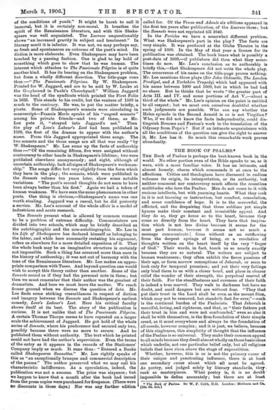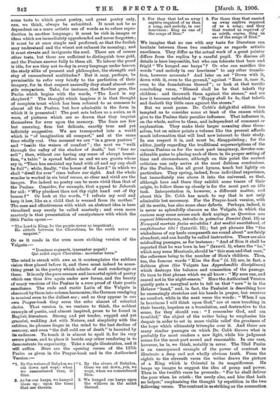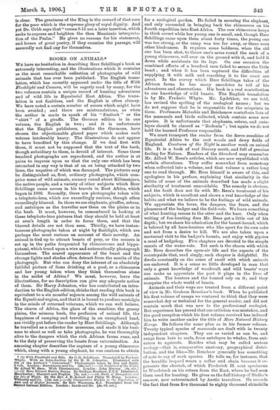THE BOOK OF PSALMS.* THE Book of Psalms is perhaps
the best-known book in the world. No other portion even of the Bible speaks to us, as it were, with a more familiar voice. It has an intimate, and almost homely, charm which commends it at once to the affections. Critics and theologians have discussed in endless volumes its origin, its interpretation, or its authority, but neither comment nor controversy much affects the countless multitudes who love the Psalter. Men do not come to it with curious intellects, but with yearning hearts. What they seek in it is not learning or instruction, but comfort, consolation, and some confidence of hope. It is to the sorrowful, the afflicted, and the despairing that these sublime yet simple hymns make their constant and irresistible appeal. And they do so, they go home so to the heart, because they come so directly from the heart. They have that inspira- tion which is not less divine because it seems for the most part human, because it seems not so much a message communicatea from without as an outflowing from the deepest springs of being, or a revelation of thoughts written on the heart itself by the very "finger of God." Their words, in fact, touch us so nearly exactly because they are so natural. The writers are subject to human weaknesses ; they often exhibit the fierce passions of their age, or form narrow conceptions of Jehovah, or seem to look only for temporal promises ; and yet their very failings only bind them to us with a closer bond, and place in clearer relief the wonder of their strength, the perpetual marvel of their faith. For the steadfastness and sureness of their faith is indeed a true marvel. They walk in darkness but have no doubt, and amid dangers but are without fear. "They that put their trust in the Lord shall be even as the mount Sion, which may not be removed, but standeth fast for ever,"—such is the continual burden of the Psalmists. That Jehovah is merciful, loving, and righteous, and that, as "their fathers put their trust in him and were not confounded," even so also it shall be with themselves, is the firm foundation of their simple creed, as it must everywhere and always be the foundation of all creeds, however complex ; and it is just, we believe, because of this singleness, this simplicity of thought that the influence of the Psalms is so universal. They make their common appeal to all minds because they dwell almost wholly on those basic ideas which underlie, not one particular belief only, but all religious beliefs that have risen above the stage of superstition.
Whether, however, this is or is not the primary cause of their unique and penetrating influence, there is at least one secondary cause about which all must be agreed. As poetry, and judged solely by literary standards, they . rank as masterpieces. What poetry is, it is no doubt impossible to define accurately ; but there are at least
• The Book of Psalm'. Ity W. F. Cobb, D.D. London: Methuen and CO. pos. 6d. net.1
some tests to which great poetry, and great poetry only, can, we think, always be submitted. It must not be so dependent on a mere artistic use of words as to refuse repro- duction in another language ; it must be rich in images or ideas which are immediately apprehended and never forgotten; it must be at once simple and profound, so that the foolish may understand and the wisest not exhaust its meaning; and it must elevate and invigorate the soul. There are of course other tests, but these are sufficient to distinguish true gold, and the Psalms answer fully to them all. To labour the proof is idle, for are they not to-day in every language under heaven the study alike of peasant and philosopher, the strength and stay of unnumbered multitudes ? But it may, perhaps, be
permissible to refer very briefly to the perfection of their imagery, for in that respect assuredly they stand almost out-
side comparison. Take, for instance, that flawless gem, the Psalm which begins with the words, 'The Lord is my shepherd." The thought which inspires it is that thought of complete trust which has been referred to as common to almost all the Psalms, but how admirable is the form in which it is presented I The poet sets before us a series, as it were, of pictures which are so drawn that they imprint themselves for ever upon the memory. The lines are few bat unerring, firm but delicate, exactly true and yet infinitely suggestive. We are transported into a world which is "of imagination all compact," and at the same time wholly real. One moment we are "in a green pasture" and "beside the waters of comfort" ; the next we "walk through the valley of the shadow of death," but "fear no evil" ; then, without our having any sense of abrupt transi- tion, "a table" is spread before us and we are guests whose cry is, "Thou has anointed my head with oil and my cup shall befall"; while, finally, "the house of the Lord" in which we shall "dwell for ever" rises before our sight. And the whole wonder is worked in six brief verses, so clear and vivid are the images. For indeed no poetry can be more vivid than that of
the Psalms. Consider, for example, that appeal to Jehovah for aid: "Why pluckest thou not thy right hand out of thy bosom ?" Or look at the words, "I refrain my soul and keep it low, like as a child that is weaned from its mother." The ease and effectiveness with which an abstract idea is here
visualised may surely be called masterly ; and even more masterly is that presentation of omnipotence with which the 99th Psalm opens :— " The Lord is King, be the people never so impatient : He sitteth between the Cherubims, be the earth never so unquiet."
Or as it reads in the even more striking version of the Vulgate:— " Dominus regnavit, irascantur populi ! Qui sedet super Cherubim: moveatur terra."
The mind is struck with awe as it contemplates the sublime vision thus placed before it, and there must indeed be some- thing great in the poetry which admits of such renderings as these. It is only the pure essence and immortal spirit of poetry 'which ean thus live again under new forms, and the beauty of many-versions of the Psalms is a sure proof of their poetic excellence. The rude and rustic Latin of the Vulgate is
charmed -by them into solemn harmonies; the German rending is-musical oven to the dullest ear; and as they appear in our own Pra.yeribook they seem the echo almost of celestial choirs. That version is, we venture to think, the noblest example of poetic, and almost inspired, prose to be found in Bnglish literature. Strong and yet tender, rugged and yet graceful, wedding Art with Nature, and simplicity with the sublime, its phrases linger in the mind to the last decline of memory, and even "the dull cold ear of death" is haunted by its cadences. To touch it is almost to spoil it, for its very errors please, and to place it beside any other rendering is to demonstrate its superiority. Take a single illustration, and it will suffice. Here are the opening verses of the 137th Psalm as given in the Prayer-book and in the Authorised Version :— "1. By the waters of Babylon we sat -down and wept: when we remembered thee, 0 Sion.
S. As for,our harps, we hanged them up : upon the trees that-are therein. "1. By the rivers of Babylon, there we sat down, yea, we wept, when we remembered Zion.
2. We hanged our harps upon the willows in the midst_ thereof. 3. For they that led us away 3. For there they that carried captive required of us then us away captive required a song, and melody, in our of us a song ; and they
heaviness : Sing us one of that wasted us requital of the songs of Sion." us mirth, saying, Sing us
one of the songs of Zion."
We imagine that no one with any taste for literature can hesitate between these two renderings as regards artistic excellence. They differ as the actual work of a great painter differs from the replica by a careful pupil. To discuss all details is here impossible, but who can tolerate that bare and frigid "We hanged our harps " ? Or who can sacrifice the words "and melody in our heaviness" to any other transla- tion, however accurate P And later on set "Down with it, down with it, even to the ground," against "Rase it, rase it, even to the foundations thereof"; or look at that terrific concluding verse, "Blessed shall he be that taketh thy children : and throweth them against the stones," and see how it becomes enfeebled as "Happy shall he be, that taketh and dasheth thy little ones against the stones."
But we must pause. Dr. Cobb's delightful edition has tempted us to consider some at least of the causes which give to the Psalms their peculiar influence. That influence is, on the whole, native to them, and independent of comment or explanation. They make their larger meaning clear them- selves, but on minor points a volume like the present affords much information that will lend new interest to their study.
In one respect it is, and must be, disappointing ; for the editor, justly regarding the traditional superscriptions of the various Psalms as for the most part imaginary, devotes con- siderable pains to placing each of them in its proper setting of time and circumstance, although on this point the acutest criticism can only arrive at the most dubious conclusions. For the Psalms, like all great hymns, touch but lightly on particulars. They spring, indeed, from individual experience, but immediately rise above it into the universal, so that, although here and there they exhibit some traces of their origin, to follow these up closely is for the most part an idle task. Interpretation is, however, a different matter, and about this Dr. Cobb has much to say that is not only admirable but necessary. For the Prayer-book version, with all its merits, has also some clear defects. Perhaps, indeed, it is never so splendidly obscure as the Vulgate, in which the curious may come across such dark sayings as Quaniam non cognavi litteraturam, introibo in potentias Domini (12:xi. 15) or Numquid mortals fades mirabilia ? Ant mediei suseitabunt, et
confitebuntur tibi ? (1xxxviii. U); but yet phrases like "the
wickedness of my heels compasseth me round about" are fairly abundant, and can hardly be called instructive. There are also misleading passages, as for instance : "And of Sion it shall be reported that he was born in her" (1xxxvii. 5), where the "he," which may seem Messianic, should be" this man and that man," the reference being to the number of Sion's children. Then, too, the famous words "Kiss the Son" (ii. 12) are, in fact, a dubious gloss (the Vulgate has Apprehendite disciplinam) which destroys the balance and connection of the passage. Or turn to that phrase which we all know : "My sore ran, and ceased not in the night-season." Here the Authorised Version quietly puts a marginal note to tell us that " sore " is in the Hebrew "hand," and, in fact, the Psalmist is describing how he unceasingly stretches out his hands in prayer, but receives no comfort, while in the next verse the words : "When I am in heaviness I will think upon God," are at once touching in their beauty, hopeless as a translation, and destructive to the sense, for they should run : "I remember God, and am troubled," the object of the writer being to emphasise his despair in order to set in more visible relief the greatness of the hope which ultimately triumphs over it. And there are many similar passages on which Dr. Cobb throws what is probably for most readers a new light, while his judgment seems for the most part sound and reasonable. In one case, however, he is, we think, notably in error. The 72nd Psalm is an unsurpassed example of the power of contrast to illustrate a deep and not wholly obvious truth. From the eighth to the eleventh verse the writer draws the picture of a King which is Oriental in its magnificence. He
heaps up images to suggest the idea of pomp and *power. Then in the twelfth verse he proceeds : "For he shall deliver the poor when he crieth : the needy also, and him that ha,th no helper," emphasising the thought by repetition in the two following verses. The contrast is as striking as the connection is clear. The greatness of the King is the reward of that care for the poor which is the supreme glory of royal dignity. And yet Dr. Cobb says that" verses 8-11 are a later insertion, which seeks to express and heighten the then Messianic interpreta- tion of the Psalm." He gives no reasons for his statement, and lovers of great poetry, if they examine the passage, will assuredly not find any for themselves.
















































 Previous page
Previous page